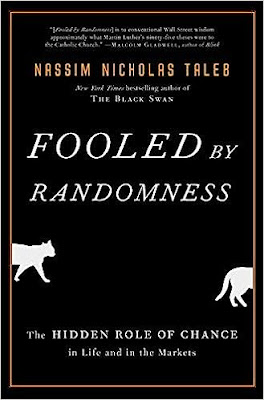Top 10 Ideas From The Book "Fooled by Randomness: The Hidden Role of Chance in Life and in the Markets" by Nassim Nicholas Taleb
"Fooled by Randomness" is a book written by Nassim Nicholas Taleb, published in 2001. The book explores the impact of randomness and uncertainty on our lives and decision-making, particularly in the context of financial markets and human behavior. Here are some of the top ideas commonly associated with "Fooled by Randomness":
1. The Role of Luck: The book emphasizes the significant role that luck and randomness play in our lives, often attributing success and failure to chance rather than skill or merit. Imagine two individuals, John and Sarah, who both invest in the stock market. John invests in a technology company, while Sarah invests in a traditional manufacturing company. Due to a sudden surge in demand for technology products, John's investment skyrockets, and he becomes wealthy. Meanwhile, Sarah's investment declines as the manufacturing industry faces a temporary downturn. While John might attribute his success to his astute investing skills, a significant portion of his gains may be due to luck, as he happened to choose a company in a booming industry.
2. Misinterpretation of Events: People tend to attribute skill and foresight to outcomes that are merely the result of luck, leading to the illusion of control and overconfidence. Michael is a trader who experiences a string of successful trades, making substantial profits in a short time. He starts believing that his trading strategy is foolproof and that he has unique insights into the market. This overconfidence leads him to take even bigger risks. However, a sudden market crash wipes out all his gains, leaving him with significant losses. In reality, his earlier success might have been influenced by a favorable market trend rather than exceptional trading abilities.
3. Survivorship Bias: We often focus on successful individuals or entities while neglecting the failures, leading to a skewed perspective on the factors contributing to success. In the world of music, aspiring artists often look up to successful musicians who have reached stardom. They study their paths to success and emulate their strategies, hoping to replicate their achievements. However, many talented musicians remain unknown and undiscovered, never making it to the spotlight. By focusing only on the success stories, aspiring artists may overlook the numerous talented musicians who did not make it big due to chance factors beyond their control.
4. Black Swan Events: Taleb introduces the concept of "Black Swan" events, which are rare, unpredictable, and high-impact occurrences that have a profound effect on society and financial markets. A portfolio manager, Rebecca, prides herself on her exceptional risk management skills. She creates a diversified portfolio, carefully balancing her investments. However, she fails to anticipate a global financial crisis triggered by a series of unpredictable events, such as the collapse of a major bank and the downturn of an emerging economy. These Black Swan events severely impact her portfolio, highlighting the unforeseeable nature of such occurrences.
5. Randomness in Financial Markets: The book challenges the traditional financial models that assume markets are efficient and predictable, highlighting the role of randomness and the difficulty in predicting market movements. Mark, an experienced financial analyst, uses complex mathematical models and historical data to predict stock prices. He invests heavily in a company he believes will perform well based on his analysis. Despite his confidence in the prediction, the stock price plummets unexpectedly due to unforeseen industry-wide factors, causing significant losses. This illustrates the limitations of relying solely on historical data and models in predicting financial market movements.
6. Overfitting and Data Mining: Taleb discusses the dangers of overfitting data and finding patterns in noise, which can lead to false beliefs and unreliable predictions. Emma, a data scientist, analyzes years of stock market data to find patterns that might indicate future price movements. She discovers a specific set of indicators that appear to predict stock price movements accurately. However, when she tests her strategy on new data, the results are far less impressive. Emma realizes that she had overfitted her model to the historical data, finding patterns that were merely coincidental rather than genuinely predictive.
7. Hindsight Bias: Hindsight bias causes people to believe that past events were more predictable than they actually were, which can lead to overestimating their ability to predict future outcomes. After a company's stock price drops significantly following a product recall, many investors claim that they "knew it all along" and that the signs were evident. However, prior to the recall, few experts and investors foresaw the issue or the impact it would have on the company's stock value. Hindsight bias leads people to believe that events were more predictable than they actually were, creating an illusion of past certainty.
8. Skepticism of Experts: Taleb advocates for skepticism towards experts and their predictions, as they are often subject to the same biases and fallacies as everyone else. Financial experts often appear on television, confidently predicting the future direction of markets and specific stocks. However, studies have shown that these predictions are often no more accurate than random guesses. Despite their credentials and appearances of expertise, these experts are susceptible to the same biases and uncertainties as laypeople.
9. Embracing Uncertainty: Rather than trying to eliminate uncertainty, Taleb suggests embracing it and building robustness and resilience to deal with unexpected events. A business owner, Laura, knows that her industry is subject to constant change, with new technologies and trends emerging regularly. Instead of trying to predict every upcoming development, Laura builds a flexible business model that can adapt to different scenarios. By embracing uncertainty and maintaining agility, she can navigate market shifts effectively.
10. Personal Reflection and Humility: The book encourages readers to reflect on their own cognitive biases and vulnerabilities to make better decisions and avoid being fooled by randomness. Daniel is a successful hedge fund manager with a track record of profitable trades. However, after reading "Fooled by Randomness," he becomes more introspective about his success. He acknowledges that while his skills and analysis play a role, luck and market fluctuations have also contributed significantly to his profits. This newfound humility helps him make more balanced decisions and manage risks more prudently.
Related Posts:
2. TOP TEN LESSONS FROM THE BOOK "ZERO TO ONE" BY ENTREPRENEUR AND INVESTOR PETER THIEL
3. TOP ELEVEN LESSONS FROM THE BOOK ""THE UNDERCOVER ECONOMIST" BY TIM HARFORD
4. TOP 10 GOVERNMENT SECONDARY SCHOOLS FOR BOYS IN ENGLAND
5. TOP 12 ESSENTIAL STEPS TO LAND A JOB IN LONDON'S THRIVING BANKING SECTOR
Other Related Posts:
2. TOP TEN IDEAS FROM THE BOOK "THINK & GROW RICH" BY NAPOLEON HILL
3. THE FIRST MOVER ADVANTAGE IN ARTIFICIAL INTELLIGENCE: PAVING THE WAY FOR INNOVATION
4. TOP DISADVANTAGES OF INHERITANCE TAX IN THE UNITED KINGDOM AND IT'S IMPACT ON WEALTH CREATION
5. THE IMPACT OF INFLATION ON THE CREATION OF WEALTH: NAVIGATING A CHANGING FINANCIAL LANDSCAPE





Comments
Post a Comment
Thanks for leaving comments. You are making this discussion richer and more beneficial to everyone. Do not hold back.